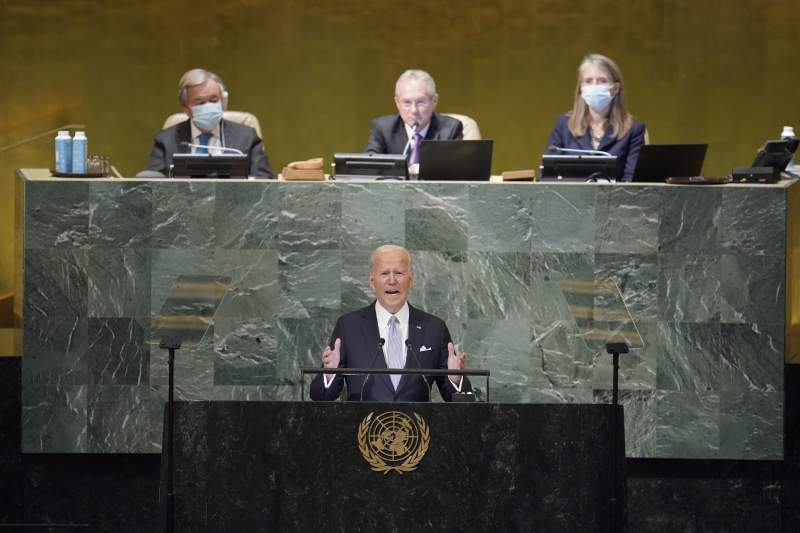
President Joe Biden addresses to the 77th session of the United Nations General Assembly on Wednesday at U.N. headquarters.
9:22 JST, September 22, 2022
UNITED NATIONS (AP) — President Joe Biden declared at the United Nations on Wednesday that Russia has “shamelessly violated the core tenets” of the international body with its war in Ukraine as he summoned nations around the globe to stand firm in backing the Ukrainian resistance.
Delivering a forceful condemnation of Russia’s seven-month invasion, Biden said reports of Russian abuses against civilians and its efforts to erase Ukraine and its culture “should make your blood run cold.” He referenced President Vladimir Putin’s announcement Wednesday that he had ordered a partial mobilization of reservists, a deeply unpopular step that sparked protests in Russia.
And Putin’s new nuclear threats against Europe showed “reckless disregard” for Russia’s responsibilities as a signer of the Treaty on the Non-Proliferation of Nuclear Weapons, Biden said.
He also criticized Russia for scheduling “sham referenda” this week in territory it has forcibly seized in Ukraine.
A permanent member of the U..N Security Council invaded its neighbor, attempted to erase a sovereign state from the map. Russia has shamelessly violated the core tenets of the U.N. charter, he told his U.N. audience.
Biden’s speech was part of an effort to maintain Russia’s isolation on the global stage as the costs of war mount, worries about energy this winter loom and Congress is likely to look more skeptically on spending more on military defense. The president called on all nations, whether democracies or autocracies, to speak out against Russia’s “brutal, needless war” and to bolster’s Ukraine effort to defend itself.
We will stand in solidarity against Russia’s aggression, period, Biden said.
Biden also highlighted consequences of the invasion for the world’s food supply, pledging $2.9 billion in global food security aid to address shortages caused by the war and the effects of climate change. He praised a U.N.-brokered effort to create a corridor for Ukrainian grain to be exported by sea, and called on the agreement to be continued despite the ongoing conflict.
Biden, during his time at the U.N. General Assembly, met with Secretary General António Guterres and held his first meeting with new British Prime Minister Liz Truss, during which they discussed Russia’s war, energy security and China. He also met with French President Emmanuel Macron and South Korean President Yoon Suk Yeol.
Biden also pressed nations to meet an $18 billion target to replenish the Global Fund to Fight AIDS, tuberculosis and malaria, reiterating the U.S. commitment of $6 billion to that goal.
Now is the moment to accelerate our efforts to reduce health inequities, and to address barriers to access including gender and human rights barriers to build a more inclusive healthcare systems, to leave no one behind, to end AIDS, tuberculosis and malaria for good, Biden said, as he was joined by leaders from Japan, Germany, France, Canada and the EU for the announcement.
But the heart of the president’s visit to the U.N. this year was his full-throated censure of Russia as its war nears the seven-month mark. One of Russia’s deputy U.N. ambassadors, Gennady Kuzmin, was sitting in Russia’s seat during Biden’s speech.
The address came as Russian-controlled regions of eastern and southern Ukraine have announced plans to hold Kremllin-backed referendums on becoming part of Russia and as Moscow was losing ground in the invasion.
Putin’s decision to “wave around the nuclear card” in televised remarks falls in line with previous menacing rhetoric he’s used during the war, according to a senior Biden administration official who was not authorized to comment publicly and spoke on the condition of anonymity. The official added that the administration has gleaned “no specific information, signals or moods” from Putin that suggest he’s taking action to prepare for utilizing Russia’s nuclear weaponry.
The White House said the global food security funding includes $2 billion in direct humanitarian assistance through the United States Agency for International Development. The balance of the money will go to global development projects meant to boost the efficiency and resilience of the global food supply.
This new announcement of $2.9 billion will save lives through emergency interventions and invest in medium- to long-term food security assistance in order to protect the world’s most vulnerable populations from the escalating global food security crisis, the White House said.
Biden was confronting no shortage of difficult issues as leaders gathered this year.
In addition to the Russian war in Ukraine, European fears that a recession could be just around the corner are heightened. Administration concerns grow by the day that time is running short to revive the Iran nuclear deal and over China’s saber-rattling on Taiwan.
His Wednesday address comes on the heels of Ukrainian forces retaking control of large stretches of territory near Kharkiv. But even as Ukrainian forces have racked up battlefield wins, much of Europe is feeling painful blowback from economic sanctions levied against Russia. A vast reduction in Russian oil and gas has led to a sharp jump in energy prices, skyrocketing inflation and growing risk of Europe slipping into a recession.
Biden’s visit to the U.N. also comes as his administration’s efforts to revive the 2015 Iran nuclear deal appear stalled.
The deal brokered by the Obama administration — and scrapped by Trump in 2018 — provided billions of dollars in sanctions relief in exchange for Iran’s agreement to dismantle much of its nuclear program and open its facilities to extensive international inspection.
While the United States is prepared for a mutual return to the Joint Comprehensive Plan of Action, if Iran steps up to its obligations, the United States is clear: We will not allow Iran to acquire nuclear weapons, Biden said.
U.S. National Security Adviser Jake Sullivan said administration officials would be consulting with fellow signers of the 2015 agreement on the sidelines of this week’s meetings.
This year’s U.N. gathering is back to being a full-scale, in-person event after two years of curtailed activity due to the pandemic.
China’s President Xi Jinping opted not to attend this year’s U.N. gathering, but his country’s conduct and intentions loomed large.
Weeks after tensions flared across the Taiwan Strait as China objected to the visit to Taiwan of House Speaker Nancy Pelosi, Biden called for “peace and stability” and said the U.S. would “oppose unilateral changes in the status quo by either side.” That came days after Biden repeated that the U.S. would militarily assist Taiwan if China sought to invade.
China’s government on Monday said Biden’s statement in a CBS “60 Minutes” interview that American forces would defend the self-ruled island was a violation of U.S. commitments on the matter, but it gave no indication of possible retaliation.
Biden on Wednesday also declared that “fundamental freedoms are at risk in every part of our world,” citing last month’s U.N. human rights office report raising concerns about possible “crimes against humanity” in China’s western region against Uyghurs and other largely Muslim ethnic groups.
He also singled out for criticism the military junta in Myanmar, the Taliban controlling Afghanistan, and Iran, where he said the U.S. supports protests in Iran that sprang up in recent days after a 22-year-old woman died while being held by the morality police for violating the country’s Islamic dress code.
Today we stand with the brave citizens and the brave women of Iran, who right now are demonstrating to secure their basic rights, Biden said.
Biden also highlighted his administration’s new investments in addressing climate change, primarily through last month’s passage of Democrats’ massive “Inflation Reduction Act” which marks the largest single U.S. investment in addressing climate change.
He encouraged other nations to meet their own environmental commitments. “And none too soon — we don’t have much time.”
Top Articles in World
-

Israeli Ambassador to Japan Speaks about Japan’s Role in the Reconstruction of Gaza
-

Videos Plagiarized, Reposted with False Subtitles Claiming ‘Ryukyu Belongs to China’; Anti-China False Information Also Posted in Japan
-

North Korea Possibly Launches Ballistic Missile
-

Chinese Embassy in Japan Reiterates Call for Chinese People to Refrain from Traveling to Japan; Call Comes in Wake of ¥400 Mil. Robbery
-

Russia: Visa Required for Visiting Graves in Northern Territories, Lifting of Sanctions Also Necessary
JN ACCESS RANKING
-

Japan PM Takaichi’s Cabinet Resigns en Masse
-

Japan Institute to Use Domestic Commercial Optical Lattice Clock to Set Japan Standard Time
-

Israeli Ambassador to Japan Speaks about Japan’s Role in the Reconstruction of Gaza
-

Man Infected with Measles Reportedly Dined at Restaurant in Tokyo Station
-

Videos Plagiarized, Reposted with False Subtitles Claiming ‘Ryukyu Belongs to China’; Anti-China False Information Also Posted in Japan























